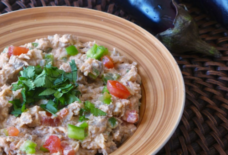The introduction of industrial methods in the 1960s turned sun-and-soil based agriculture into a system that required the use of pesticides and sterile seeds that could not be saved and used again. The diversity of heirloom seeds fell victim to the notion of progress, and the pride farmers had in their traditional knowledge of farming gradually diminished.
In the very north of the West Bank is the village of Al Jalamah. Here, Majid Abu Farha tends a farm filled with rows of heirloom watermelon, courgette, tomato, peas and squash. He’s been using natural baladi seeds for three years, ever since meeting Sansour through a friend and attending her workshops on seed saving. “We are proud to have our own seeds and for using our heritage, our grandfather’s seeds, because it’s something to safeguard our identity,” Abu Farha explained.
The land around Battir is part of the Fertile Crescent, along with modern day Iraq, Syria, Jordan and Lebanon. From this region, wheat was domesticated; some of the wheat Sansour and her community work with is approximately 10,000 years old, dating back to the beginning of agriculture. “The reason the English eat biscuits and everyone eats bread is because of our ancestors,” said Sansour.
Sansour’s library renews the cycle of these seeds being grown and saved. Planted once more, heirloom crops reestablish the ancient conversation with soil and environment that allows them to keep evolving, and to stay on the dinner table for generations to come.









